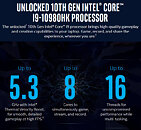- Joined
- Oct 9, 2007
- Messages
- 47,795 (7.40/day)
- Location
- Dublin, Ireland
| System Name | RBMK-1000 |
|---|---|
| Processor | AMD Ryzen 7 5700G |
| Motherboard | Gigabyte B550 AORUS Elite V2 |
| Cooling | DeepCool Gammax L240 V2 |
| Memory | 2x 16GB DDR4-3200 |
| Video Card(s) | Galax RTX 4070 Ti EX |
| Storage | Samsung 990 1TB |
| Display(s) | BenQ 1440p 60 Hz 27-inch |
| Case | Corsair Carbide 100R |
| Audio Device(s) | ASUS SupremeFX S1220A |
| Power Supply | Cooler Master MWE Gold 650W |
| Mouse | ASUS ROG Strix Impact |
| Keyboard | Gamdias Hermes E2 |
| Software | Windows 11 Pro |
In no mood to cede mobile performance leadership to AMD and its Ryzen 9 4900HS processor, Intel is readying its new flagship mobile part, the Core i9-10980HK. Based on the 14 nm "Comet Lake-H" silicon, this chip packs an 8-core/16-thread CPU with a maximum boost speed (aka "Thermal Velocity Boost") of 5.30 GHz, while maintaining an aggressive power target of 45 W TDP. This should put the chip's performance somewhere between the desktop Core i7-9700K and the Core i9-9900K, both of which have TDP rated at 95 W, although the chip could perform very close to the latter at gaming, thanks to its 300 MHz higher boost frequency. Intel is expected to launch the 10th generation Core i9 H-series processors on April 2nd, around the same time when NVIDIA launches its mobile GeForce RTX 20 Super series.

View at TechPowerUp Main Site

View at TechPowerUp Main Site








